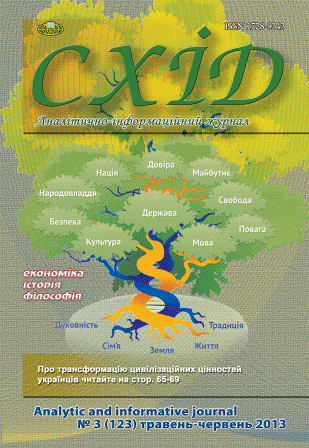Classification improvement of impact factors of micro-level on activity of maritime enterprises
DOI:
https://doi.org/10.21847/1728-9343.2013.3(123).15056Keywords:
micro-level, factors' classification, maritime enterprises, shipping companies, ports, ship-repair shore basesAbstract
Modern condition of development of transport enterprises is in poor condition, caused by the global economic crisis. Enterprises of maritime transport are especially sensitive to negative tendencies. They belong to infrastructure and dramatically depend on economic condition of the country.
The factors of macro-, meso- and micro-level influence on enterprise's activity. The enterprise can foresee, influence, correct, control, forecast only internal factors, i.e. factors of micro-level. Thanking to this matter, it is able to improve and increase its efficiency, competitiveness and avoid crisis situations.
Studying on the internal factors, defining the direction and quantitative evaluation of their impact on enterprises' activity is necessary condition to develop methodological instrument of anti-crisis management on maritime enterprises, to forecast their development, to develop particular offers regarding their efficiency increase. Additionally, activity's peculiarity of separate maritime enterprises causes gross differences in factors' forming influencing on their functioning effect.
That is why the article is devoted to research and improvement of impact factors' classification of micro-level on activity of maritime enterprises by means of distribution of internal factors according to classification groups, sub-groups detailed with synthetic and analytical performances-factors. General and specific sub-groups of impact factors on shipping companies, sea and river ports and ship-repair yards are defined. We proved necessity of factors' definition in making analysis of efficiency of enterprises' activity, finding strong and weak sides in their operation, making forecast of their development and developing effective approaches in management, including anti-crisis.Downloads
References
Акимова О. В. Факторы влияния на транспортный процесс в системе трампового судоходства [Електронний ресурс] / О. В. Акимова. - Режим доступу : http://www.rusnauka. com/SND/Tecnic/4_akimova.doc.htm.
Боняр С. М. Судоходство река - море: проблемы развития судовладельческих компаний : [монография] / С. М. Боняр. - Одесса : ИПРЭЭИ НАН Украины, 2009. - 288 с.
Коба В. Г. Шляхи виходу з економічної кризи судноплавних компаній України / В. Г. Коба, І. В. Гладка // Водний транспорт : зб. наук. праць КДАВТ. - 2012. - Вип. 2 (14). - С. 67-72.
Котлубай В. О. Організаційно-економічні основи оцінки конкурентоспроможності судноплавних компаній на фрахтовому ринку : дис. ... канд. екон. наук : 08.07.04 / Котлубай Вячеслав Олексійович ; НАН України ; Інститут проблем ринку та економіко-екологічних досліджень. - Одеса, 2004. - 218 с.
Маляр С. Б. Класифікація деструктивних факторів економічної безпеки підприємств портової діяльності [Електронний ресурс] / С. Б. Маляр. - Режим доступу : http://www.nbuv. gov.ua/Portal/Soc_Gum/Rmugt/2010_32/Files/3210.pdf.
Щербина В. В. Методичні засади оцінки інтеграції судноплавних та стивідорних компаній в умовах глобалізації світової торгівлі [Електронний ресурс] / В. В. Щербина // Вісник економіки транспорту і промисловості. - 2009. - № 26. - С. 51-55. - Режим доступу : http://www.nbuv.gov.ua/PORTAL/ Natural/Vetp/2009_26/index.html.
Заходи боротьби зі шкідливим впливом на екологію. Альтернативні рішення [Електронний ресурс]. - Режим доступу : http://lib.chdu.edu.ua/pdf/ pidruchnuku/7/162.pdf.
Коба В. Г. Економічний аналіз діяльності підприємств водного транспорту / В. Г. Коба, О. Є. Бабина, М. В. Ковбатюк, Н. Г. Беник. - К. : КИТ, 2011. - 340 с.
Форс-мажорні обставини [Електронний ресурс]. - Режим доступу : http://economic.br.com.ua/форс-мажорні-обставини/.
Akimova O. V. Impact factors on the transport process in the system of tramp shipping, available at: http://www.rusnauka.com/SND/Tecnic/ 4_akimova.doc.htm. (rus).
Bonyar S. M. (2009), Shipping river-sea: problems of the development of shipping companies, Scientific monograph, IPREEI NAN Ukraine, Odessa, p. 228. (rus).
Koba V. G., Gladka I. V. (2012), Ways of overcoming economic crisis of shipping companies of Ukraine, Maritime transport, collection of scientific articles KSMA, Kyiv, Edition 2(14), pp. 67-72. (ukr).
Kotlubay V. O. (2004), Organizationally-economic basis of competitiveness evaluation of shipping companies on the freight market,Thesis for the degree of candidate of economic sciences in specialty 08.07.04, Odessa, 218 p. (ukr).
Malyar S. B. (2010), Classification of destructive factors of economic security of enterprises with port activity, available at: http://www.nbuv.gov.ua/Portal/Soc_Gum/Rmugt/2010_32/Files/3210.pdf. (ukr).
Shcherbyna V. V. (2009), Methodological principles of integration evaluation of shipping and stevedoring companies in the conditions of globalization of world trade, Newsletter on economics of transport and industry, № 26, pp. 51-55, available at: http://www.nbuv.gov.ua/PORTAL/Natural/ Vetp/2009_26/index.html. (ukr).
Control measures for decrease negative impact on the environment. Alternative suggestions, available at: http://lib.chdu.edu.ua/pdf/ pidruchnuku/7/162.pdf. (ukr).
Koba V. G., Babyna O. E., Kovbatyuk M. V., Benyk N. G. (2011), Economic analysis on activity of maritime enterprises, Textbook, KYT, Kyiv, p. 340. (ukr).
Force majeure, available at: http://economic.br.com.ua/форс-мажорні-обставини/.(ukr).
Downloads
Published
How to Cite
Issue
Section
License
Copyright (c) 2013 Maryna Kovbatyuk, Viktoryia Shklyar

This work is licensed under a Creative Commons Attribution-NonCommercial-NoDerivatives 4.0 International License.
1. Authors bear responsibility for the accuracy of facts, quotations, numbers and names used.
2. Manuscripts are not sent back.
3. The publisher does not always agree with the authors' opinion.
4. The authors reserve the right to authorship of the work and pass the first publication right of this work to the journal under the terms of a Creative Commons Attribution-NonCommercial-NoDerivatives 4.0 International License. This license allows others to distribute (copy) the published work for non-commercial purposes, provided there is mandatory attribution to its authors and a link to the first publication in our journal.
5. The authors have the right to conclude separate supplement agreements that relate to non-exclusive work distribution in the form in which it has been published by the journal (for example, to upload the work to the online storage of the journal or publish it as part of a monograph), provided that the reference to the first publication of the work in this journal is included.

